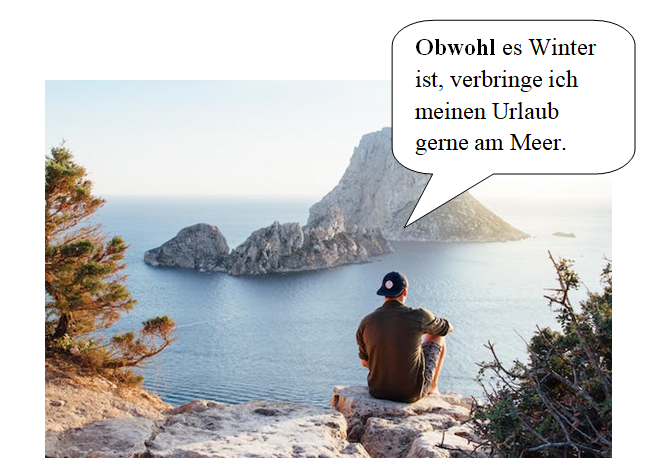In this lesson, you will learn about concessive clauses and concessive conjunctions “obwohl” and “trotzdem” in German. You will understand their meanings and usage and learn about the conjunctions “zwar …, aber” and “trotz” and their respective definitions and applications. Additionally, you will gain clarity on the differences between “deshalb” and “trotzdem.”
Thank you for reading this post, don't forget to subscribe!CONTENTS
Concessive clauses
Obwohl/ (al)though
Trotzdem
Trotzdem vs. Deshalb
Zwar …, aber
Trotz
Wenngleich, obschon, obgleich
Concessive clauses
Concessive clauses are all about giving a counter-reason, restriction, or concession. You set up a condition with the subordinate clause and then show a consequence that doesn’t happen as expected in the main clause. It’s like saying, “If this, then that, but whoops, not really.”
Concessive conjunctions typically include the equivalents for English “although” or “even though,” as well as the forms that correspond to English “however,” “wher(so)ever”.
It also covers conditional concessive conjunctions like “even if,” such as selbst wenn, auch wenn, sogar wenn, and wenn … auch.
Obwohl/ (al)though
Obwohl is the most frequent concessive conjunction in spoken and written German. Obwohl corresponds to English (al)though, even though. Clauses introduced with the conjunction obwohl are dependent clauses. Obwohl-clause can come before or after the main clause. When the obwohl-clause comes first, the main clause begins with a verb.
For Example:
Sie gingen spazieren, obwohl es regnete. -They went for a walk even though it was raining.
Obwohl es regnete, gingen sie spazieren.-Although it was raining, they went for a walk.
Trotzdem/ nevertheless
Trotzdem corresponds to English nevertheless (still, yet, anyway, regardless). It is a coordinating conjunction and connects two main clauses. Trotzdem-clause expresses an unexpected twist. The verb comes immediately after trotzdem.
For example:
Meine Frau will abnehmen, trotzdem isst sie viel Schokolade. – My wife wants to lose weight, but she still eats a lot of chocolate.
With obwohl it would be like this:
Obwohl meine Frau abnehmen will, isst sie viel Schokolade. –Although my wife wants to lose weight, she eats a lot of chocolate.
Sentences with trotzdem can be placed with both a period and a comma.
For example:
Ich war gestern Abend müde, trotzdem bin ich ins Konzert gegangen. – I was tired last night, but I still went to the concert.
Ich habe überhaupt keine Lust. Trotzdem gehe ich mit dir ins Teather. – I don’t feel like it at all. Nevertheless, I’m going to the Teather with you.
Trotzdem is often paired with aber. Aber gives even more emphasis to the conjunction trotzdem. Together they have a meaning: but in spite of that/ but…still
For example:
Ich war gestern Abend müde, aber trotzdem bin ich ins Konzert gegangen. –I was tired last night, but I went to the concert anyway.
I was tired last night, but I still went to the concert.– I was tired last night, but I went to the concert anyway.
Defferences between Trotzdem and Deshalb
Deshalb functions as a coordinating conjunction, connecting two main clauses. It stands in the second main clause and have a causal meaning, corresponding to “therefore,” “thus,” or “because of” in English.
For example:
Sie ist krank, deshalb arbeitet sie heute nicht. & Sie ist krank. Sie arbeitet deshalb heute nicht.- She’s ill, therefore she’s not working today.
So, “deshalb” and “trotzdem” can be placed in different spots in a sentence. Both of these conjunctions can go in the first or third position of a clause. When they are in the first position of a clause, the finite verb comes right after them, and when they are in the third position, the finite verb comes right in front of them. “Trotzdem” gives the feeling of conceding, showing an unexpected sequence, and is similar to English words such as “nonetheless,” “still,” “yet,” “anyway,” or “regardless.”
For example:
Sie ist krank, trotzdem arbeitet sie heute. & Sie ist krank. Sie arbeitet trotzdem heute.
She’s ill, but she’s still working today. &She is ill. She is still working today.
Zwar …, aber
A common alternative way to express concession is a construction with zwar … aber, i.e. with two main clauses. The first one has the particle zwar, and the second is introduced by aber.
For example:
Ich wollte dich zwar gestern besuchen, aber dann kam etwas dazwischen.
I wanted to visit you yesterday, but then something came up.
Zwar…, aber is a two-part conjunction and appears in two main clauses. Zwar stands in the first and aber in the second main clause. It corresponds to English: although…, but. Zwar occupies different places in a sentence, and aber is usually placed after a comma.
For example:
Die Wohnung ist zwar klein, aber sie ist sehr gemütlich.-The apartment may be small, but it’s very cozy.
Mein Vateristzwarsehr alt,abernochimmer fit.-My father is very old, but still fit.
Zwar ist ihr Kleid modern, aber es ist nicht schön.– Her dress is modern, but it’s not pretty.
Aber can be followed by trotzdem or dennoch, to emphasize the meaning.
For example:
Die Wohnung ist zwar klein, aber trotzdemsie ist sehr gemütlich.-The apartment is small, but it is still very cozy.
Die Wohnung ist zwar klein, aber sie ist trotzdem sehr gemütlich.-The apartment may be small, but it is still very cozy.
Zwar…, trotzdem može da povezuje i rečenične delove.
For example:
Zwar müde, aber sehr glücklich ging sie nach Hause. – She went home tired but very happy.
Trotz
Preposition “trotz” + genitive is often replaced by dative in spoken language. In English, it means “despite.”
For example:
Trotz des schlechten Wetters, machten wir eine Radtour. – Despite the bad weather, I went for a bike ride.
In spoken language, the dative case is used with “trotz.”
For example:
Trotz dem schlechten Wetters, machten wir eine Radtour.-Despite the bad weather, we went for a bike ride.
Wenngleich, obschon, obgleich
Conjunctions “wenngleich,” “obschon,” and “obgleich” also mean “although,” but they are less frequent than “obwohl” and largely restricted to writing.
For example:
Das Kleid sieht sehr modern aus, wenngleich es nicht neu ist. – The dress looks very modern, even though it is not new.
Ihre Präsentation war sehr gut, obgleich sie nicht vorbereitet war. – Her presentation was very good, although she was not prepared.
Obschon sie alle ihre Pläne erfüllte, war sie unzufrieden. – Although she fulfilled all her plans, she was dissatisfied.
See more:



